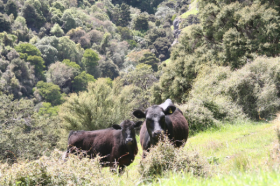Principal Investigator
Dr Marion Johnson - no longer staff
Summary
 Agroecology can be difficult to define, it means different things to different people; the simplest definition is putting the ecology back into agriculture. The idea is to farm with nature not against it, to use modern technology but to think of the farm as a whole system - land, water, stock and people. Conventional agriculture has given great gains but also huge problems. In the Indigenous Agroecology project we draw on the traditional knowledge and wisdom of our elders and the knowledge of scientists and practitioners to develop an agricultural system that looks after the land, the water and the people. If our soils are healthy, then our pastures are healthy and our stock are healthy. If we can re-introduce our native plants (and other species) back onto our farms and use them for a multiplicity of purposes such as rongoā, manuka honey, habitat for beneficial insects and birds, land stabilisation or riparian buffers the land, the water and communities benefit and we have a truly sustainable agriculture.
Agroecology can be difficult to define, it means different things to different people; the simplest definition is putting the ecology back into agriculture. The idea is to farm with nature not against it, to use modern technology but to think of the farm as a whole system - land, water, stock and people. Conventional agriculture has given great gains but also huge problems. In the Indigenous Agroecology project we draw on the traditional knowledge and wisdom of our elders and the knowledge of scientists and practitioners to develop an agricultural system that looks after the land, the water and the people. If our soils are healthy, then our pastures are healthy and our stock are healthy. If we can re-introduce our native plants (and other species) back onto our farms and use them for a multiplicity of purposes such as rongoā, manuka honey, habitat for beneficial insects and birds, land stabilisation or riparian buffers the land, the water and communities benefit and we have a truly sustainable agriculture.
Project Overview
The Indigenous Agroecology project seeks to build the foundation for the sustainable management of agricultural land and water in Aotearoa New Zealand. The intent of the research is to provide a platform for Mātauranga Māori and Totohungatanga Moriori to inform land management, with emphasis on kaitiakitanga and the weaving of cultural and ecological values into the production matrix. The research also seeks to align traditional knowledge with science. The enhancement of indigenous biodiversity on productive lands is more likely to succeed if it is done in partnership with agriculture, and if the benefits are clearly demonstrated and articulated. Indigenous Agroecology highlights the inter-relationship between water and land, and looks for better ways to manage the land to protect the water resource. Aligned with this philosophy this research seeks to use native plants, mātauranga Māori and totohungatanga Moriori to restore the resilience and mauri of the land and water to provide for the economic and cultural well-being of communities.
Research Updates
2013: The team went to Taiporutu to do a State of the Takiwa environmental survey. Part of the survey involved a SHMACK analysis of Taiporutu Creek, which gave the farm a baseline measurement. We also planned the bio-remediation work for 2014.
Earlier, Jamie and Olivier finished installing the next set of lysimeters on Taiporutu. They also successfully trialled the ability of manuka and kanuka mulch in a bio-wall system to remove pollutants from farm run off.
Project Publications
Transforming Agriculture with Native Plants and Indigenous Knowledge, Indigenous Ecology Symposium, ECOTAS, 2013
Indigenous Agroecology poster at V11 Southern Connection Congress 21-25 January 2013, Dunedin
Acknowledgements
We wish to acknowledge the support of our funders Ngā pae o te Māramatanga and our research farm communities, Te Putahi and Te Kaio trusts , Taiporutu trust and Hokotehi trust.
Funder: Nga pae o te Maramatanga
Contract value: $600,000
Term: April 2012-December 2014
Researchers: Jamie Ataria and Olivier Champeau (Cawthron Institute), Maui Hudson (Te Kotahi Research Institute)
Otago: Dr Tony Moore (Surveying), Dr Janice Lord (Botany), Dr Cilla Wehi (CSAFE)
Research Link farms: Te Putahi, Taiporutu, Hokotehi trust